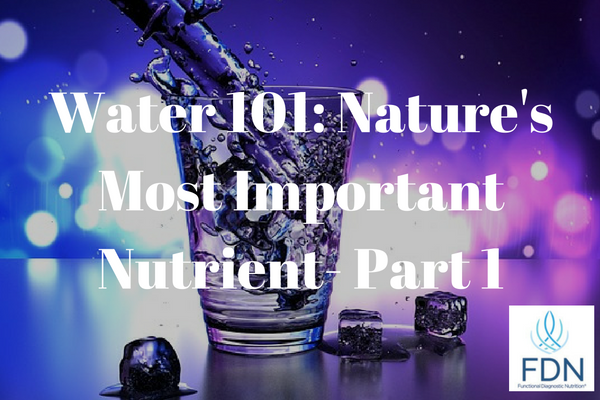Do you know that basics of water and why it’s so important to your health? It’s time for water 101.
It doesn’t get the same media attention as green tea, flax seeds or antioxidants. It doesn’t have the glamour and prestige attached to the latest new superfood. When talking about nutrition, it often gets overlooked. Yet, it plays a much more critical role in our daily lives than many other elements. Without it, life as we know it would not exist.
I’m talking about Water
Water doesn’t get the credit it deserves. The human body is approximately 75 percent water. Every system in the body depends on water. It’s important for healthy skin, hair, and nails, energy and clear thinking. It is also important for controlling body temperature, heart rate, and blood pressure. Water is arguably the most valuable essential nutrient for a body. According to the experts, water is ranked second only to air as an essential for life. A person can survive about two months without food, but only a few days without water.
Unsung Hero
In our modern society, the wonders of water seem to be downplayed. Perhaps this is because it is so easily accessible and readily available, that we take it for granted. Or maybe, we just don’t fully understand the importance of proper hydration. But, no one is really talking about water when it comes to health. Sure, we’ve all heard the 8 glasses a day recommendation over and over again. But, do we know why we need 8 glasses a day? Who came up with that number, anyway? And is it even correct?
Water 101
It’s time to give water its moment in the spotlight, so it can shine like the star that it is. We’ve been around water all of our lives, but how well do we really know it? What is it made of, where does it come from, and what role does it play in our body? How much of it do we really need to be drinking? What is water? Water is the most omnipresent substance on our planet. It is all around you, and it is in you. Yet, it has many unique physical properties that are poorly understood. You learn in chemistry class that water is H2O. Two hydrogen atoms bonded with a single oxygen atom. But water, as we know it, is so much more than a single molecule of H2O. In fact, you’ll hardly find a single H2O molecule by itself anywhere in nature. Water molecules are strongly attracted to each other and link together in chains. Due to the polarity of the oxygen molecule, many substances can easily dissolve in it. For this reason, water is known as the universal solvent.
So, water in nature consists of many H20 molecules linked together with other substances dissolved into it. This is what gives water its life. Drinking water, for example, can contain several electrolytes (substances in solution that conduct an electric current) including calcium, chloride, fluoride, magnesium, potassium and sodium. (Some of which are good and some are bad – more on this later)
Water Works Wonders
Water is the most abundant substance in the body and is intricately involved in so many bodily functions.
- Transportation- Blood and lymph are made primarily of water. Water in blood helps transport oxygen, nutrients, antibodies and waste products into and out of the cells in blood. In the lymphatic system, adequate water is crucial to proper waste management and toxin removal.
- Nourishment– Water plays a role in the digestion and absorption of food. The digestive enzymes in the saliva and the mucus membranes that line your entire digestive tract depend on water to stay moist and ready to break down and absorb nutrients.
- Elimination– water helps take some of the burden off of the kidneys and liver by flushing waste products. Water in the digestive tract helps to prevent constipation by keeping things moving through the colon.
- Energy production– Water is the medium for most chemical reactions in the body, including the all-important reactions in the mitochondria. That’s where ATP, or energy, is produced. This is why fatigue often accompanies dehydration.
- Communication– The body uses water as a pathway for neurotransmitters throughout the entire body.
- Temperature Control – The body uses water as a coolant, helping to regulate body temperature during exercise, fever, and in hot environments.
- Protection – Water cushions joints and protects tissues and organs like the brain and spinal cord from shock and damage.
Dangerously Dry
While most people know perfectly well that water is necessary for good health, up to 75 percent of the American population falls short of their daily required intake– which, in medical terms, means that most people in the U.S are functioning in a chronic state of dehydration. Remember your body is composed of over 70 percent water, muscles are 75 percent, and your brain is 85 percent water. Since the body cannot store water for future use, it must be continually replenished. Lack of water can lead to dehydration, a condition that occurs when you don’t have enough water in your body to meet optimal functional requirements.
Even mild dehydration – as little as a 1 percent to 2 percent loss of your body weight – can sap your energy and make you tired. Dehydration poses a particular health risk for the very young and the very old.
Signs and symptoms of dehydration include:
- Excessive thirst
- Fatigue
- Headache
- Dry mouth
- Little or no urination
- Muscle weakness
- Dizziness and lightheadedness
Your body loses 1.5-2.5 liters of water per day on average. (If you work out or live in a warm climate, you will probably lose even more). It makes sense that you would need to replace what you lose.








